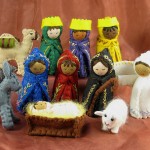
Can you remember Christmas when you were a child? What was it like? Did you have certain traditions that still are meaningful for you? Do you have memories of waiting for the special day?
Of course, not everyone has pleasant memories of Christmases in the past. But hopefully you do – and if you’re like me, many of your childhood memories revolve around one thing: presents! I remember seeing gifts under the tree and wondering just what might be inside the packages. Visiting grandparents gave me another round of this sense of expectation, too – more gifts to open and to share!
Here we are, just a few days before Christmas. The level of anticipation and expectation is rising every moment for today’s children (and some adults, to be fair). Why don’t we experience that kind of excitement during the rest of our lives?
One of the hymns of our faith, “I’ll Fly Away,” expresses this feeling as it relates to our hope for life beyond the grave:
Some glad morning when this life is o’er, I’ll fly away.
To a home on God’s celestial shore, I’ll fly away.
Chances are, you know the tune to that song. In fact, you might be singing it to yourself right now. Christians love to sing this song (and songs like it) because of its catchy tune, its upbeat tempo, and its message of hope. We live as people of hope, who believe that God will bring about a brighter tomorrow, who trust that Jesus will return, will raise his people up, and will live with them in glory forever.
Isn’t it hard to live with a sense of anticipation that Jesus’s return will happen soon? I think it’s certainly harder for Christians to live in expectation of that time than it is for children to live in expectation of Christmas morning. Christmas is a regular, predictable event, but the return of Christ is mysterious, unknown, perhaps distant. Yet this is part and parcel of our faith as followers of Christ: that his return is imminent, that we may see him in our lifetime, that the time is drawing near.
Just a few more weary days and then I’ll fly away.
To a land where joy shall never end, I’ll fly away.
Friends, live with expectation! Watch for signs of anticipation in the youngest among us, and learn from their example. We are people of hope! We are people who expect Christ’s return! We are people who are waiting just a few more days!
–Pastor David





